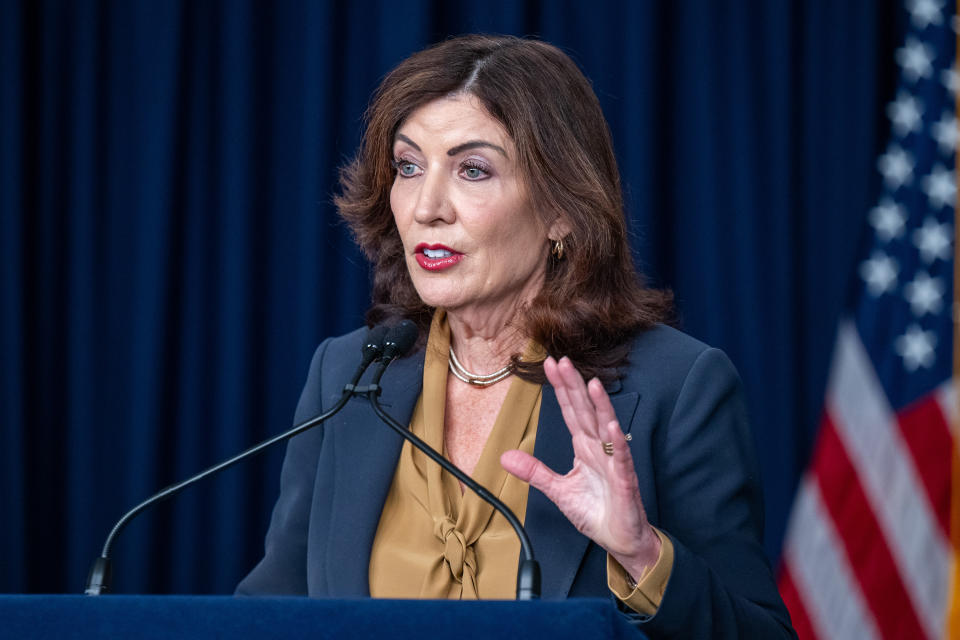Gov. Hochul vetoes New York ban on noncompete agreements

NEW YORK — Gov. Kathy Hochul, who has often cast herself as a fierce ally of workers, has vetoed major labor legislation that would have banned noncompete agreements in New York State.
The legislation, passed by lawmakers in June, came as part of a national push to limit the use of noncompete pacts, which block employees from leaving their jobs to work at competing employers. The agreements are believed to depress wages; their defenders say they protect trade secrets.
Hochul, who had been caught in a tug-of-war between well-funded labor and business interests over the bill, sought changes to the ban in negotiations with lawmakers this month, fretting that such an expansive measure would hamper New York’s pandemic-challenged business sector.
But negotiations broke down Friday, a development previously reported by The Wall Street Journal.
Hochul had suggested only applying the ban to workers making up to $250,000 a year. Pro-labor interests had hoped Hochul would sign the bill without tweaks, or at least with a higher financial floor carved out for the exceptions to the ban. Negotiations between Hochul and lawmakers failed over whether to include bonuses in calculating the cap, according to two people with knowledge of the negotiations.
“I’m incredibly disappointed that our final offer was rejected,” Sean Ryan, the Buffalo Democrat who sponsored the bill in the state Senate, said in a Friday statement. “We put forward a compromise proposal to the Executive Chamber that would have ended the use of noncompetes for anyone with a base salary under $250,000, indexed that amount to inflation, and protected all health care workers from being subject to noncompete agreements.”
“Sadly, this common sense offer was rejected,” Ryan added.
In a memo explaining her veto released by her office early Saturday, Hochul said some New York firms had “legitimate interests that cannot be met with the Legislation’s one-size-fits-all approach.” She said she was open to approving more narrowly tailored legislation in the future.
Hochul, a moderate Democrat, often touts her links to labor but has also taken pains to cultivate warm relations with Wall Street. Tens of thousands of dollars flowed to advertising campaigns on both sides of the noncompete issue.
And the Federal Trade Commission, which has proposed a rule that would ban noncompetes nationwide, wrote to Hochul last month outlining the negative effect noncompetes have on workers: an estimated loss of at least $250 billion in worker pay a year in the U.S.
Hochul said she wished the FTC had already implemented some sort of ban — suggesting that the lack of a federal policy left her in a bind, not wanting to drive away business to the many states that lack bans.
Minnesota banned noncompetes last spring, joining California, Oklahoma and North Dakota in a small club. A larger group of states has instituted rules against subjecting low-wage workers to noncompetes.
California has had a ban on the measure since the 19th century. But the nation’s most-populous state was long an outlier.
In an extended reflection on the issue at a Manhattan news conference last month, Hochul said that giving middle- and low- income workers professional mobility was one of her “values” and “priorities.”
About 44% of employers statewide subject some workers to noncompete agreements, and about 23% subject all workers to the agreements, according to the Economic Policy Institute, a nonprofit.
There is a relatively broad consensus in New York politics that noncompete agreements are inappropriate for low-wage jobs. Noncompetes have proliferated in such jobs; the FTC said a third of American workers making under $40,000 a year have been shackled at some point by noncompete agreements.
But Kathy Wylde, chief executive of the Partnership for New York City, said a ban affecting high earners would create a mass departure of financial firms that use noncompetes to protect intellectual property and relationships.
The Partnership for New York City, a powerful business lobby, circulated a memo that suggested an amendment to the bill limiting the ban to workers earning under $250,000 per year.
The outcome was closely watched. A New York ban would have amounted to a national labor earthquake, according to employment lawyers.
David Kappos, a former director of the U.S. Patent and Trademark Office and an opponent of a blanket ban, said earlier this month that a ceiling on the ban would send a “very positive message that enables people like me to advise companies and their boards: ‘Yeah, invest in New York.’”
Ryan, the bill sponsor in the Senate, said that even a blanket ban was “pro-business,” arguing that noncompetes stifle entrepreneurship.
“You’ll hear it from people in the tech industry: If they’re under a noncompete, and they’re not happy with their workplace, they often just get a job out of state,” Ryan said in an interview last month.
But in the end, the plan faltered.
“I have to be cognizant of the fact that we have had an environment in this state for too long that has driven high-net-worth individuals and businesses out,” Hochul told reporters in November.

 Yahoo Finance
Yahoo Finance 